|
Numbers Game
As my long-awaited retirement approaches, I am increasingly looking forward to spending more time with the leaning tower that is my pile of To-Be-Read books: books I actually want to read – indeed may have actually purchased - rather than the constant stream of crime novels I am expected to read. When Mr Gladstone said he had been ‘borne down by a torrent of gin and beer’ he had been referring to the 1870 Licensing Act, but I think I know how he felt. I am now too old and too cynical to make sensible judgements on the 300+ new crime novels I receive each year, let alone the thousands of eBooks and self-published novels which I never see.
So far this year, and the year is not yet half over, I am aware of 367 new titles being published in 2023 and, even more frightening, I have received a bound proof of a crime novel being published on 18th January 2024!
After 34 years as a reviewer of crime fiction, I believe I have covered almost three thousand new titles. From 1989 to 2008, I reviewed 972 new novels in print media including the Sunday Telegraph, Daily Telegraph, Publishing News and the Birmingham Post. From then on it becomes more difficult to estimate the number of titles I have covered in Shots and other online media, but thanks to an algorithm provided by the Black Ops division of Cambridge Analytica, my best guess is 1,860, which will make a total of 2,832 reviews by the time Getting Away With Murder #200 is posted.
I hope I have always been fair and I have certainly tried to be kind, much preferring to recommend titles rather than rubbish them, following my mother’s advice that if you can’t say anything good about one, say nowt. Nothing irritates me more than when once-great newspapers devote half a page to pouring scorn on the latest Dan Brown or Jeffrey Archer when there are so many good books around. I am proud to say that I never received a death threat (unlike one fellow reviewer) and only one letter of complaint, though I was once accosted by an author at a crime writing convention with the words ‘You haven’t reviewed my new book’ to which I replied ‘There’s no need to thank me.’
Along the way, I have met many talented writers through reviewing, and some of them became long-standing friends, among them Janet Neel, Ben Pastor and Minette Walters. I also had the privilege of comparing opinions with noted reviewers of crime fiction, including Julian Symons, Harry Keating, Marcel Berlins, Philip Oakes, Tim Binyon, Matthew Coady, Jessica Mann, Peter Guttridge, Bill Pardoe, Jake Kerridge and Maxim Jakubowski. (And ten of those eleven very kindly reviewed my own crime writing.)
When asked, as I once was by a new publicity officer for a leading publisher ‘what sort of crime novels do you like?’, I replied: ‘Good ones.’ More honestly, I think the answer should be that all reviewers are looking for ‘something new’.
Having said that, I must admit to getting more pleasure these days in recommending old favourites to a new generation of readers before titles and their authors are totally forgotten, and this I will continue to do through my regular ‘Bargain Hunt’ column in the magazine CADS and, if allowed, in Shots.
Reviewing almost 3,000 thrillers over years involved at least looking at something like 18,000 titles as there was never enough time or space to do them justice – and by no means did I see all published crime fiction. To anyone thinking of chancing their arm at reviewing, I would advise they follow the old maxim:
The greatest trick the Devil ever pulled was to convince the world he did not exist. The greatest trick the reviewer can pull is to convince an author they have read to the end of their book.
Agatha Specials
I don’t know if there is a special occasion behind the attractive new hardback editions of two Agatha Christie titles this month by publisher HarperCollins, but then, who needs an excuse?
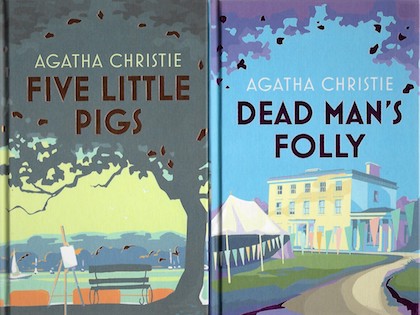
As it happens, these are two Christies I have never actually read - Five Little Pigs, from 1943, and Dead Man’s Folly from 1956 – and so I consulted, as I often do, the late Robert Barnard’s scholarly appreciation of the works of the Great Dame, A Talent To Deceive.
Barnard’s view of the Poirot adventure Dead Man’s Folly is that ‘Nobody much is what they seem and old sins cast long shadows. Mrs Oliver looms large’ but reserves his most fulsome praise for Five Little Pigs: ‘All in all, it is a beautifully tailored book, rich and satisfying.’ He even goes so far as to claim that in his opinion ‘this is the best Christie of all.’
Parliamo Italiano
My Italian lessons continue at pace, thanks to the third and final series of Il Cacciatore (The Hunter) as shown by Walter Presents on All 4 or whatever it’s called this week.
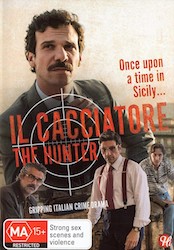
This is a fantastic dramatization of the fight against the Sicilian Mafia in the 1990s by a group of brave and utterly dedicated investigating magistrates based in Palermo. The effect of this decade-long struggle on both the hunters and the hunted is quite brilliantly shown, though it fails to explain why known, wanted fugitives were able to survive in hiding in Sicily, continuing to run their criminal empires and sanctioning hundreds of murders, for almost thirty years without the local population seeming to notice them. Perhaps that was the point.
Escapism
As a schoolboy I was very familiar with the name Eric Williams, as the author of numerous books on the escapades (pun intended) of British servicemen escaping from German Prisoner-Of-War camps during WWII, his most famous being the autobiographical The Wooden Horse which was published in 1949 and filmed in 1950.
I was not aware that after his successful escape from captivity in Poland in 1943, Williams (1911-83) returned to England via Sweden and served in MI9, encouraging and supplying resistance movements in Europe. Nor did I know that in 1956, Williams and his second wife were the first ‘westerners’ allowed to travel unaccompanied, on an extended camping holiday through communist Hungary, Rumania (Romania) and Bulgaria. That trip provided the inspiration for a pair of thrillers featuring Roger and Kate Starte, a pair of roving travel writers living out of a Land Rover converted into a sort of dormobile weaving their way through Eastern Europe, the first of which was Dragoman in 1959.
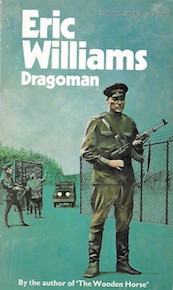 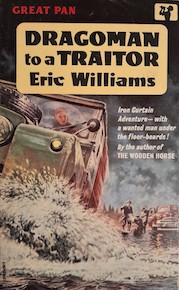
Originally published as Dragoman Pass, in one paperback edition as Dragoman To A Traitor and then, finally, in 1970, simply as Dragoman – the word meaning a guide or translator in the days of the Ottoman Empire, which is slightly misleading as the central characters, who speak no Slav languages, don’t do much translating. ‘Dragoman Pass’ is also a red-herring as the couple may have entered Bulgaria via the pass, but they escape from the other end of the country, crossing the border with Turkey.
An escape is necessary as our innocent travellers get lumbered with a British archaeologist being held against his will by the Rumanian authorities while they doctor the findings of his excavations to fit the party orthodoxy. Reluctantly at first, the plucky Brits agree to hide the rather ungrateful archaeologist in their vehicle and set off across Rumania and Bulgaria looking for an exit, whilst avoiding (with suspicious ease), secret policemen, dodgy smugglers and border patrols. There is a fair amount of political tub-thumping about the communist regime versus good old English democracy, though our heroic couple have no qualms about trading nylon stockings for local currency on the black market, but the strength of the book is not as a thriller, but more as a travelogue of colourful countries which Williams clearly had affection for, though given the time of his visit – 1956 – was probably glad to escape from.
Lawton’s Law
At the recent CrimeFest on the ‘(Forgotten) Authors Remembered’ panel, John Lawton urged, nay, ordered, his audience to read the work of American short story maestro Stanley Ellin (1916-86).
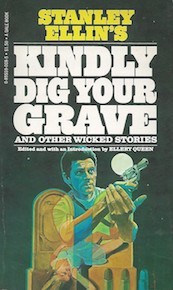
Although the author of some noted crime novels, Ellin is best remembered for his award-winning short stories (more than thirty of them) and as I always do what John Lawton tells me, I began to seek them out, realising that it must be nearly fifty years since I read his most famous novel House of Cards. By pure chance, I lighted upon Ellin’s last published collection, Kindly Dig Your Grave, of stories first published in Ellery Queen’s Mystery Magazine between 1963 and 1977.
I had not been aware of this anthology or had read any of the stories contained in it before now, so I count that as a Win-Win situation and one which should put me in John Lawton’s good books, though not literally.
Pulp Quest
I have a bespoke (book) dealer who supplies my craving for vintage pulp paperbacks who has come up trumps once again with a brace of American hardboiled classics.
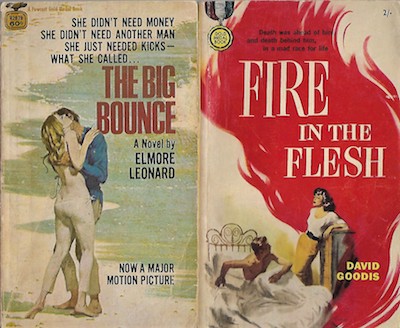
Although I already own the 2001 Robert Hale hardback, I was delighted to receive the 1969 Fawcett Gold Medal edition of Elmore Leonard’s The Big Bounce. What I had not known before this was that the novel was filmed twice. In the 1969 version the action was moved from Michigan to California and the film starred Ryan O’Neal and Van Heflin. It was not well-received, least of all by Elmore Leonard, who called it ‘the second worst movie ever made’ the very worst being the 2004 remake – the setting moved to Hawaii this time – starring Owen Wilson, Morgan Freeman and Vinnie Jones, no less.
The second half of my pulp double bill was also a Fawcett Gold Medal book, though this time published in the UK (hence the two shillings price mark) by Frederick Muller in 1958. Now recognised as one of the masters of American noir fiction David Goodis (1917-67) published Fire in the Flesh towards the end of his writing career and it is, I believe, quite a rare book these days.
Pregnant Pause
Richard Osman has made a killing, literally, with the idea of a group of people sharing the same life environment, if I can call it that, solving murders, in his case, a gang of Over Active Pensioners in a retirement home. It is a concept which has been done with other ‘special interest’ groups before, including professional crime writers, but I have never come across, until now, a plot where the murder is investigated by a National Childbirth Trust class of expectant mothers.
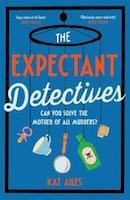
I believe the original title of The Expectant Detectives [Zaffre], the debut crime novel of Kat Ailes, was in fact The NCT Murders which reminded me of my own experience, many years ago, of attending a local NCT class as a not-so-innocent bystander. What I learned there about what those ladies were about to go through left me in no doubt that they would make formidable opponents for any murderer.
|
|
BOOKS OF THE MONTH
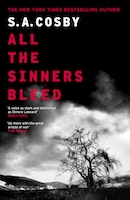
‘No place was more confused by its past or more terrified of the future than The South’ thinks the main character and that is pretty much the underlying theme of the outstanding All The Sinners Bleed by S.A. Cosby [Headline]. Titus Crown is the first Black sheriff of Charon County, Virginia, a quiet backwater where statues of Confederate ‘heroes’ are still honoured and the poisonous legacy of slavery is much in evidence. An unusual ‘school shooting’ (not the sadly familiar massacre of students) reveals something very nasty bubbling under the surface of life in Charon with its snake-handling churches and failing local industries. And then bodies are discovered, a lot of bodies, all cruelly tortured. A former FBI agent, Titus realises there is a serial killer lurking in plain sight in the population of Charon and begins the hunt, although he himself becomes a target. As a serial-killer-thriller, All The Sinners Bleed is up there with Silence of the Lambs, but as a crime novel which peels back the onion-layers of racism and bigotry in the southern states, it is in a class of its own. Simply superb.
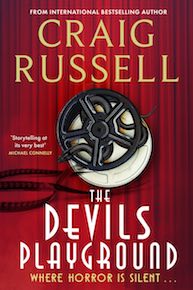
I don’t know if anyone has officially called old Hollywood ‘the devil’s playground’ but they certainly should have if half the diabolic goings-on actually went on as described in Craig Russell’s epic thriller The Devil’s Playground [Constable]. The multi-award winning Russell spins his blood-splattered story across almost seventy years, though the crux of the matter is ‘the greatest horror film ever made’ in Hollywood in 1927, at the twilight of the silent era. Needless to say the film is lost to posterity after a series of events so weird – even for Hollywood – that they are surely the result of voodoo. The Hollywood here – its stars, its ‘fixers’ and its venal studio bosses – revel and prosper in corruption, proving that the devil not only has the best tunes, but the best screenplays. [Check out the review and feature by Craig]
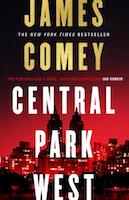
For no good reason, when I heard that former FBI Director James Comey was writing a thriller, I assumed it would be about spies, political chicanery and the impeachment of a US President or two. Actually, Central Park West [Head of Zeus] is a conventionally twisty American legal thriller and a very good one at that. The detail of law enforcement agencies and procedures is, as to be expected, immaculately accurate as a murder trial runs concurrent with an investigation into organised crime and the tantalising prospect that the actual murderer may be a Mafia hit woman. The courtroom scenes zing with tension and there are many examples of smart-aleck lawyers having the Persian rug pulled from under them.
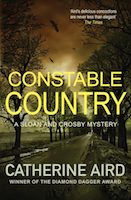
For a charming and relaxing change of pace, I always look forward to a ‘Calleshire Chronicle’ which record the investigations of Detective Inspector Sloan and Detective Constable Crosby in the cosy, but criminous county invented by Catherine Aird which contains places with names such as Little Missal, Capstan Purlieu and Kinnisport (very much an in-joke). Constable Country [Allison & Busby] is the 28th in the series by the Diamond Dagger winning Aird, who celebrates publication this month, a few days before her 93rd birthday. It begins with an investigation of the missing partner in a local specialist printing company – ‘missing’ along with all the firm’s cash – just as a prestigious memoir for a local toff is about to come off the presses; a memoir with the delectably ridiculous title Muniments and their Hanapers. Pretty soon, though, there’s a murder and a near-fatal assault to add to Christopher Dennis Sloan’s workload (he’s known as ‘Seedy’ because of his initials) but the cool, calm and collected policeman sieves out the red herrings. Along the way is much fascinating background on vintage printing lore, including (which I did not know) where the term Foolscap came from.
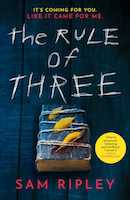
Bad things happen in threes and to three specific young females in particular in The Rule of Three [Simon & Schuster] by Sam Ripley (no relation). When the bad things include the deaths of parents and siblings at suspicious intervals involving the number three, is something supernatural happening, is it the result of drug-induced paranoia or is there good-old serial killer on the loose? The story unfolds over twenty years and in the voices of multiple, mostly unreliable, narrators and includes many useful tips on taking drugs and one very gruesome bit of psychotic self-analysis. In some ways it is reminiscent of the Scream franchise of ‘slasher movies’ (but without the slashing) and I would not be surprised, if it’s filmed, were it to spawn a slew of sequels: Rule of Four/Five/Ten etc. ‘Sam Ripley’ is one of several pen-names used by a successful British thriller writer and you will note the name contains nine (three time three) letters. Coincidence? Probably not.

If you want proof that the Swiss certainly did not spend five hundred years of brotherly love inventing the cuckoo clock, try one of the Inspector Hunkeler books by Hansjörg Schneider, the latest to appear in translation, The Murder of Anton Livius, is now published by Bitter Lemon Press. Like Maigret, Hunkeler seems to solve crimes by some form of osmosis from the numerous restaurants and bars he visits (and there is a lot of snacking in this book) in either the frosty Swiss heartland of Emmental or over the border from his base in Basel into Alsace. An elderly Russian (or German?) immigrant is found shot and hung on a butcher’s hook on his allotment, which just happens to be over the border in France, but Hunkeler cannot resist getting involved and tracing the identity of the victim. (The tattoo under the left arm should have been a give-away.)
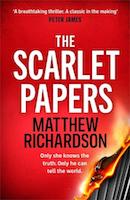
Kim Philby and the infamous ‘Cambridge’ ring of spies once again show that they are the gift to spy fiction which just keeps on giving. The legend of Russian moles at the heart of British (and American) intelligence services at the height of the Cold War is given a new twist in The Scarlet Papers [Michael Joseph] by Matthew Richardson, a long (perhaps a tad too long) spy saga in which the ‘papers’ in question, as curated by an innocent academic, seem likely to blow the lid off fifty years of treachery. Impressive, superior spy stuff.
Re-Discovery of the Month
Following an all-too-brief conversation recently with thriller writer William Shaw about story-tellers we both admired, I was taken with the urge to revisit the work of Nevil Shute (1899-1960) and I began with his autobiography Slide Rule and then his 1932 romantic thriller Lonely Road.
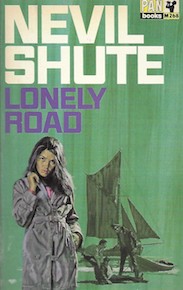 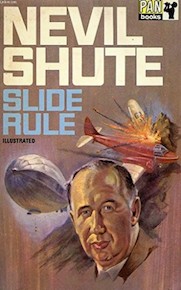
Autobiographies of writers, though there are exceptions, are usually best avoided, but Nevil Shute Norway, to give him his full name, was an aeronautical engineer of some repute before he became a best-selling novelist and in Slide Rule, his part-time hobby of writing fiction is really only mentioned in passing compared to his work on airships and aeroplanes in the 1930s. One book that is mentioned with affection, mainly because sale of the film rights provided him with financial security, was his third novel Lonely Road.
It was perhaps Shute’s first attempt at experimenting with the way he told his stories and although the bulk of the novel is a slow-burn romance across the class divide of the period, it is topped and tailed by a thriller involving gun-running, an extended chase by boat along the south coast and a suitably tough resolution, finally revealing the ruthlessness of the central hero. Whilst some of the attitudes towards women, although accurate for the characters at the time, might get him cancelled these days, he really was a master yarn-spinner.
Eastern Approaches
Publisher Pushkin Vertigo is dedicated to promoting crime fiction ‘from the four corners of the globe’ and for this month’s output, its compass needle points firmly eastwards with a Japanese classic and a new voice from India.
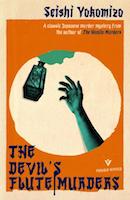
Often ranked alongside Agatha Christie in his native Japan, Seishi Yokomizo (1902-81) was a prolific author of mysteries including his series of (a staggering) seventy-seven titles featuring his private detective Kosuke Kindaichi. In The Devil’s Flute Murders, which I think is published in English for the first time, Kindaichi is called in to investigate the murder of a former viscount (the setting is 1947) and noted flautist even though the story begins with a warning from the narrator: I have no pleasure in putting down in words all the misery it holds.
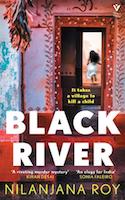
A name to watch if she goes on garnering rave reviews, which I am sure she will, is Nilanjana Roy whose powerful debut thriller Black River is out now. Set in a modern India bubbling over with religious tension, the body of a young girl is found hanging from a tree in the nondescript (Hindi) village of Teetarpur and suspicion immediately falls on an itinerant Muslim. Resolving the killing and preventing the villages from taking the law into their own hands falls to Sub-Inspector Ombir Singh who has only one officer to command and one working revolver between them.
Are You Not Entertained?
It is well-known that I could never resist addressing an adoring crowd, or even an angry pitchfork-waving mob, from a second-century AD Roman balcony.

Appearances, though, can be deceptive as this particular balcony was not in situ but an exhibit in Berlin’s fabulous Pergamon Museum, which I made sure I visited before it closes for extensive redevelopment later this year.

Auf wiedersehen,
Der Ripster
|